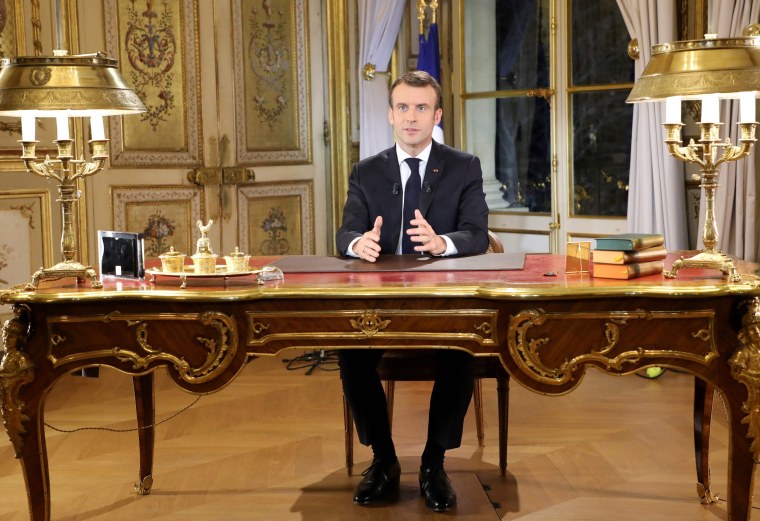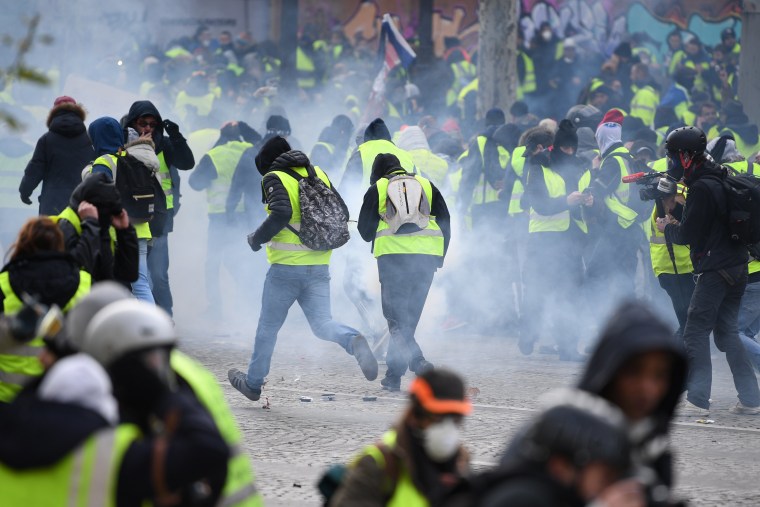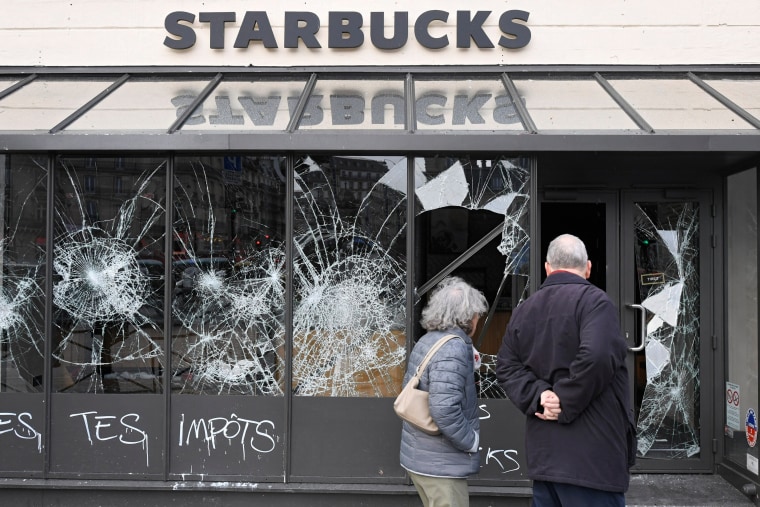Facing a political career in jeopardy, French President Emmanuel Macron announced a raise in the country's minimum wage and tax relief measures during an address to the nation Monday following a fourth weekend of increasing violence by "yellow jacket" protesters.
Macron said he would be raising the minimum wage in France by 100 euros a month, or about $114, beginning in 2019.
While he said that he would not reinstate a tax on the wealthy that earned him the nickname "president of the rich," Macron made several key concessions, among them eliminating an unpopular increase in pensions for retirees earning less than 2,000 euros a month.
Other tax concessions included no taxes on overtime pay, and encouraging employers to pay tax-free year-end bonuses.
Macron, who took office last year, also said he was declaring "an economic and social state of emergency."
"I know I've hurt some of you with my words," he said during a televised address Monday night. "I want tonight to be very clear with you: I've fought to shake up the system that we have in place. This is because I want to serve our country, which I love."
In the 13-minute speech, he called on the nation to unite "for our future." He noted the "legitimate anger and unacceptable violence" that has swept through France, and praised the police officers deployed across the country.

"Thank you for the courage and exceptional professionalism that you displayed," he said.
The announcements comeamid criticism that he has failed to act over the crisis prompted by his economic reforms — including a hike in gas taxes that his government last week agreed to scrap.
Earlier, Macron met with lawmakers, unions and business leaders to hear their concerns following demonstrations that began in struggling provinces and spread to rioting in the capital.
By Monday night, more than 260 people arrested over the weekend in Paris appeared in court, according to the prosecutor's office. Many complained they were beaten by police, tear-gassed or hit by rubber bullets.
A video went viral of police appearing to tip a protester out of his wheelchair.
In Bordeaux, a port city in southwestern France, a 26-year-old identified as Antoine told France Inter radio that he planned to file a complaint against the police after he lost his right hand to a tear gas grenade. The local prosecutor said the man attempted to throw the device back at police when it exploded. In the Gironde region, also in the southwest, police said two people were hit in the eye by rubber bullets.
Laurent Nunez, the deputy interior minister, defended the 89,000 police officers deployed nationwide in the largest response to the "gilets jaunes," or "yellow jacket" movement, named for the fluorescent safety vests that French motorists must carry in their vehicles.
"Our forces of order stood up with sang-froid and determination to extremely violent individuals," Nunez tweeted.

More than 8,000 police were deployed in Paris, which was hit by the worst rioting in a half-century. But unlike the protests on Dec. 1, centered around the Arc de Triomphe, many of the 10,000 protesters on Saturday fanned out across the city center, which saw pockets of looting and burned cars.
An additional 125,000 protesters marched in other towns and cities across France, the Interior Ministry said. Nearly 2,000 arrests were made and the violence left 264 people wounded, including 39 police officers.
What began as a revolt against the gas tax rises has morphed into a broader rebellion against Macron’s 18-month presidency. A November poll found that his approval rating was as low as 26 percent.
France's finance minister, Bruno Le Maire, warned that the unrest was spooking tourists and investors and had already knocked 0.1 percentage points off France's GDP this quarter.
"Our country is deeply divided," Le Maire said. "It is the president's role to unify the country."
Earlier, Le Maire promised to help the owners of stores damaged by rioters. He told Euronews that the protests are harming the "attractiveness of France" for business.
Paris Mayor Anne Hidalgo said 550 municipal cleaners had helped clear the city’s streets after the turmoil and thanked firefighters for their efforts.
France’s retail federation said stores had lost about $1 billion of pre-Christmas sales since the unrest began.
Macron was elected on a reformist agenda, having pledged to overhaul the country's generous welfare state, which redistributes wealth across society with high taxes for the rich.
France has high levels of social security and workers' rights, making it difficult to enact business-friendly reforms in spite of persistent unemployment.
Last week, he attempted to quell the protests by agreeing to drop the gas tax increase, which prompted truckers to call off a planned strike.
However, one student group has called for a week of blockades and demonstrations.

Interior Minister Christophe Castaner warned Saturday that the "gilets jaunes" movement risked being infiltrated by radicals.
"These last three weeks have created a monster," he told reporters. "Our security forces will respond with firmness and I will have no tolerance for anyone who capitalizes on the distress of our citizens."

